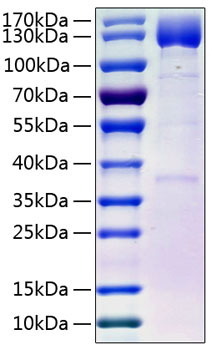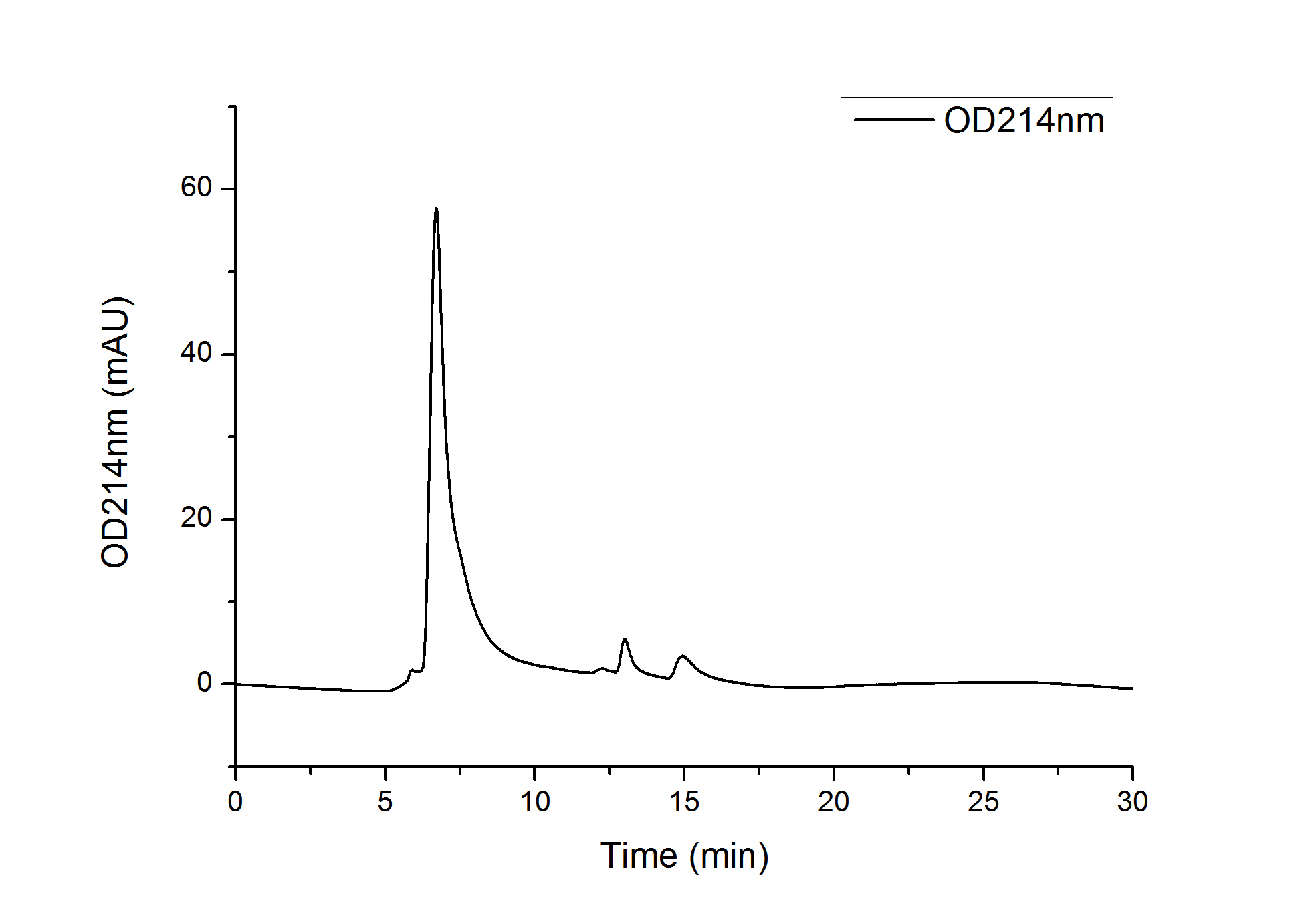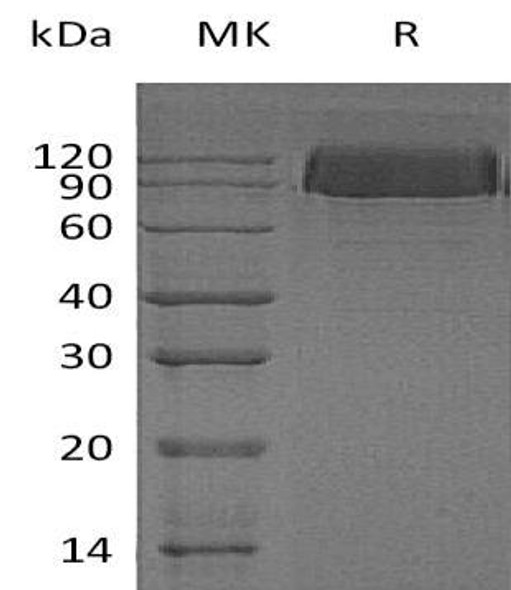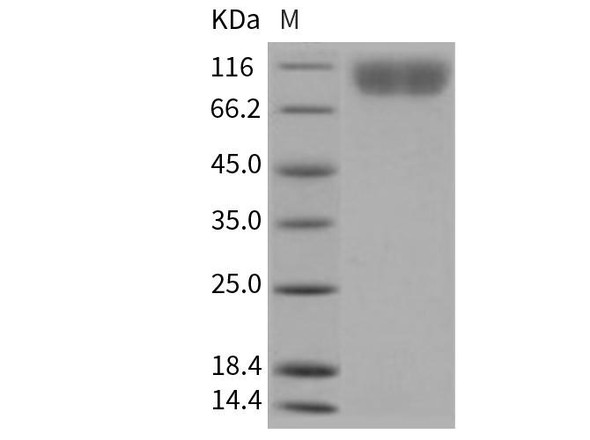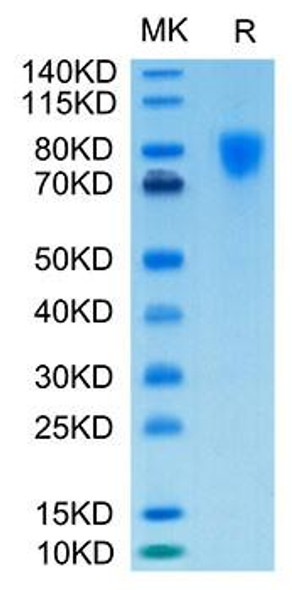Description
Recombinant Human PDGFR-beta/CD140b (E241D) Protein
The Recombinant Human PDGFR-beta/CD140b (E241D) Protein is a biologically active recombinant protein that plays a significant role in various cellular processes and signaling pathways in human biology. This protein is widely employed in immunological research, cell biology studies, protein-protein interaction analyses, and therapeutic development, providing researchers with a reliable tool for investigating PDGFR-beta/CD140b (E241D) function and its implications in health and disease.
This product (SKU: RPCB0314) is produced using HEK293 cells and features a C-hFc&His tag for convenient detection and purification. The protein exhibits a calculated molecular weight of 82.86 kDa with an observed molecular weight of 110-140 under denaturing conditions, achieving ≥ 90% as determined by SDS-PAGE;≥ 90% as determined by HPLC.. Functional bioactivity has been validated through rigorous quality control assays, confirming its suitability for demanding research applications.
Key Features
| High Purity by Affinity Chromatography | |
| Mammalian & Bacterial Expression Systems | |
| High lot-to-lot consistency via strict QC |
| Product Name: | Recombinant Human PDGFR-beta/CD140b (E241D) Protein |
| SKU: | RPCB0314 |
| Size: | 10 μg , 20 μg , 50 μg , 100 μg |
| Reactivity: | Human |
| Synonyms: | CD140B, IBGC4, IMF1, JTK12, KOGS, PDGFR, PDGFR-1, PDGFR1, PENTT, PDGF Receptor beta, PDGFRB, PDGFR beta |
| Tag: | C-hFc&His |
| Expression Host: | HEK293 cells |
| Calculated MW: | 82.86 kDa |
| Observed MW: | 110-140 |
| Gene ID: | 5159 |
| Protein Description: | High quality, high purity and low endotoxin recombinant Recombinant Human PDGFR-beta/CD140b(E241D) Protein (RPCB0314), tested reactivity in HEK293 cells and has been validated in SDS-PAGE.100% guaranteed. |
| Endotoxin: | < 0.1 EU/μg of the protein by LAL method. |
| Purity: | ≥ 90% as determined by SDS-PAGE;≥ 90% as determined by HPLC. |
| Formulation: | Lyophilized from a 0.22 μm filtered solution of PBS, pH 7.4.Contact us for customized product form or formulation. |
| Bio-Activity: | Measured by its binding ability in a functional ELISA. Immobilized recombinant Human PDGF-B at 2 μg/mL (100 μL/well) can bind recombinant Human PDGFRB. The EC 50 of Human PDGFRB is 30.48 ng/mL. |
| Reconstitution: | Centrifuge the vial before opening. Reconstitute to a concentration of 0.1-0.5 mg/mL in sterile distilled water. Avoid vortex or vigorously pipetting the protein. For long term storage, it is recommended to add a carrier protein or stablizer (e.g. 0.1% BSA, 5% HSA, 10% FBS or 5% Trehalose), and aliquot the reconstituted protein solution to minimize free-thaw cycles. |
| Storage: | Store at -20℃.Store the lyophilized protein at -20℃ to -80 ℃ up to 1 year from the date of receipt. After reconstitution, the protein solution is stable at -20℃ for 3 months, at 2-8℃ for up to 1 week. |
The protein is a cell surface tyrosine kinase receptor for members of the platelet-derived growth factor family. These growth factors are mitogens for cells of mesenchymal origin. The identity of the growth factor bound to a receptor monomer determines whether the functional receptor is a homodimer or a heterodimer, composed of both platelet-derived growth factor receptor alpha and beta polypeptides. This gene is flanked on chromosome 5 by the genes for granulocyte-macrophage colony-stimulating factor and macrophage-colony stimulating factor receptor; all three genes may be implicated in the 5-q syndrome. A translocation between chromosomes 5 and 12, that fuses this gene to that of the translocation, ETV6, leukemia gene, results in chronic myeloproliferative disorder with eosinophilia.


